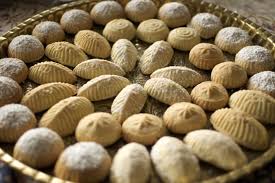
By Nahia Houssari — arabnews.com — BEIRUT: As the women gather around the table to make maamoul cookies for Easter, they all feel that this year’s celebrations will be different, and probably for the worse. Hala Dagher, speaking on behalf of her sisters, said: “This year we decided to split the cost of maamoul and only make half of the usual quantity. “Maamoul cookies represent blessings and we cannot celebrate Easter without them, even in a small amount.”
The Lebanese are known for their attachment to family and traditions, especially on special occasions and holidays. One of the country’s traditions, especially at Easter, is that women gather a few days before the big weekend to make maamoul cookies filled with walnuts, pistachios, or dates. The cookies are among the most famous Lebanese sweets prepared for Easter. The dough is made of semolina, sugar, butter, rose water and blossom water, and can be covered in icing sugar. The dough is traditionally made on Good Friday and the cookies baked the following day. However, austerity has hit many Lebanese homes as all ingredients are priced in US dollars. Very few people have decorated for Easter this year, and many will not be buying eggs to paint as a symbol of resurrection and life. Those who buy chocolate eggs are rare as the treats have become too expensive.
A World Food Program report showed that more people than ever are relying on food assistance across Lebanon as the country suffers from one of the world’s worst economic crises. It said: “More than half of the Lebanese population are now in need of assistance to cover their food and other basic needs. “The local currency’s sharp decline is paralyzing people’s purchasing power as the Lebanese lira reaches a new record low each day, propelling food price increases.” Dagher said: “We have been dispensing with many holiday traditions because they are out of our budget. “We even decided to make homemade Palm Sunday candles, using an olive branch and some ribbon to decorate them. We cannot deprive our children of joy. The simplest candle costs $15 and that’s 1,500,000 Lebanese pounds, the equivalent of half of my salary as a public sector employee.”
Samah Dagher, a relative of Hala’s, makes floral party decorations for private events. She said: “Easter this year is the worst; the rich would rather spend the holidays abroad. “Families who have relatives living abroad visit them for the holidays. The well-off families who remain in Lebanon are reluctant to spend their money on luxuries because they are afraid of a darker future. “Their money has been withheld by banks so they are very cautious when it comes to spending their cash because they have no confidence in the state. “Although I’m barely working, I still believe that all children must enjoy the holidays and carry candles on Palm Sunday, so I agreed with a priest in Beirut to split the cost of decorating children’s candles. The child brings the candle and we decorate it. That way we keep the joy of the holiday alive.”
Claudine Pichon, a Lebanese woman of French origins who sells homemade sweets, said: “Some families who used to order one kilogram of maamoul cookies are now ordering half a kilo. However, others are barely affected by the economic crisis and have not changed their usual orders.” Pichon is amazed at the price differences from just a year ago. She said: “A kilo of pistachios cost $16 last year; it’s $22 this year. A big box of butter costs 9,500,000 Lebanese pounds, compared to 3,000,000 Lebanese pounds last year. “If we take into account the cost of gas, electricity, and delivery, the cost of making and selling maamoul cookies has doubled.” Maamoul prices vary from one pastry shop to another but the price of a kilo with dates in popular stores ranges between $12 and $22. The price of maamoul with walnuts is between $19 and $26, while with pistachios it exceeds $30. The price of a kilo of chocolate eggs is $35.
Pichon added: “People want to rejoice at Easter, and we, as sweetmakers, cannot raise our prices much, otherwise no one will buy our products.” A great Easter tradition in Lebanon is egg tapping. As family members gather after Sunday lunch, each person chooses a decorated colored egg before engaging in the egg-tapping competition. The person whose egg remains uncracked wins. However, the competition may be scarce in the country this year with the price of a box of eggs at 500,000 Lebanese pounds. Shops would usually be filled with chocolate eggs and Easter decorations at this time of year, but very few people are shopping ahead of the festival.
Nawal, a clothing store employee in the Furn El Chebbak, said: “Since everything is priced in US dollars but people are still getting paid in Lebanese pounds, the people’s purchasing power has significantly dropped. “Many no longer visit shops that carry well-known brands and shop at outlet stores.” Large numbers of Christian youths have left the country in the last three years, particularly in the aftermath of the Beirut port explosion.
The presidential vacuum is another issue, while tensions remain between Christian parties. Christian lawmakers were scheduled to respond to the invitation of Maronite Patriarch Bechara Boutros Al-Rahi for a meeting of prayer and repentance on April 5, in an attempt to curb tensions. Meanwhile, charities are struggling to provide relief and assistance for needy families. Religious authorities urge Christians to remain in Lebanon, but all the people can do this Easter is pray for their country’s resurrection.



